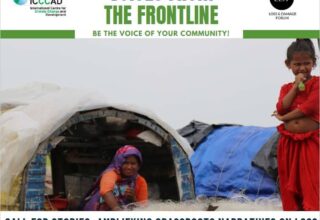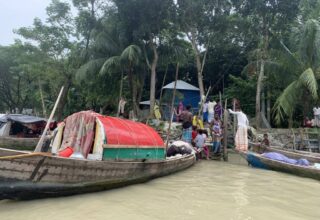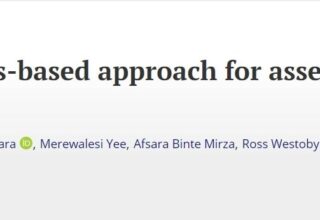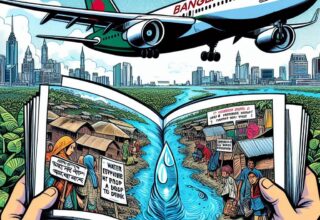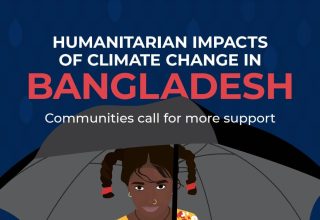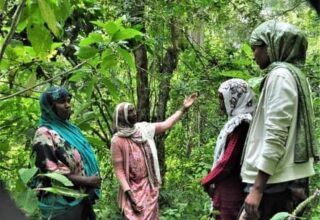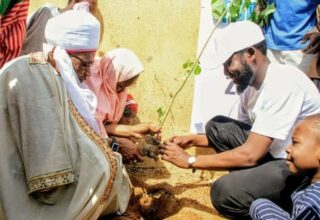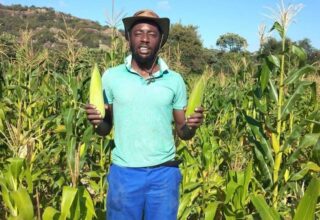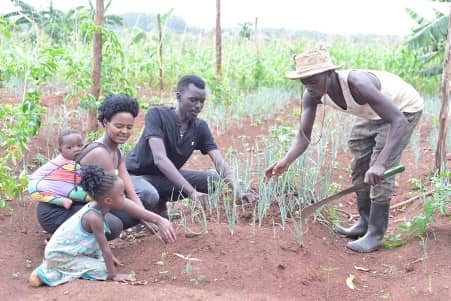
Capacitating refugee groups in Uganda to fight malnutrition and food insecurity through climate-smart agriculture practices. This is the thirteenth of the ‘Voices from the Frontline (Phase-II)’ stories by ICCCAD and GRP.
Kiryandongo refugee settlement in western Uganda is home to over 70,000 refugees. While the majority of this population is from neighbouring countries affected by conflicts like DR Congo, Rwanda, Kenya and Burundi, the settlement also hosts people internally displaced from a landslide hotspot (Bududa district) in Eastern Uganda. Aid reduction due to the Covid-19 pandemic and subsequent lockdowns significantly impacted global supply chains and particularly food supplies for the refugees; which has led to hunger and malnutrition.
Catalytic Grants to support refugees
The Catalytic Grant programme was initiated by International Centre for Climate Change and Development (ICCCAD), Climate Justice Resilience Fund (CJRF) and Global Resilience Partnership (GRP), with an aim to award targeted grants to implement ideas geared towards enhancing locally-led climate change adaptation and resilience.
CBA15 Catalytic Grant winners Stephen Bright Sakwa and Susan Nanduddu worked with Global Refugee Initiatives; a local NGO in Kiryandongo refugee settlement to address the challenges arising from hunger and malnutrition during the covid-19 pandemic. “We were inspired to act by news in the media that indicated food aid had been disrupted by the pandemic, as lockdowns affected supply chains and funding worldwide, meaning refugees were facing hunger and malnutrition,” said Stephen. The NGO trained and encouraged refugee groups to grow their own food using climate smart techniques, as the area had been profiled by the National Risk and Vulnerability Atlas of Uganda in 2019 as being highly susceptible to drought. To demonstrate the effectiveness of climate-smart practices, a water source was constructed to offer water for irrigation. Some of the practices that were demonstrated included irrigation, mulching, agroforestry, integrated pest management, planting high-yielding and quick maturing vegetables as well as paying attention to national weather forecasts.
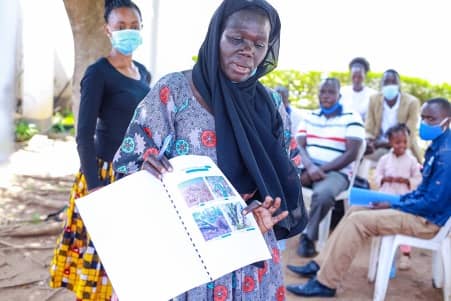
Accepting your reality and taking local action
The refugees do not want to find themselves in the same desperate situation as in 2019 again. Gloria Ahmed Drani is a refugee and mother of 4 who has been in the settlement since 2014 due to an attack on her home area in South Sudan by rebels. Since then and before the Covid-19 pandemic; she grew cone, cassava and vegetables as a luxury; as they mainly depended on food aid from development partners. While they made losses from climate change disasters occasionally, it did not matter so much. “When we first came here the seasons were well aligned; I used to harvest ten bags of cone from my garden; but now the weather is unpredictable and we make a lot of losses” Gloria remarked.
After receiving the climate smart agriculture training, Gloria worked with a group of fellow refugee women to change the status quo of entirely depending on food aid and being helpless in the face of climate change. Splitting into groups of twenty, they grow high value vegetables on an acre of land provided by Global Refugee Initiatives. Five groups are currently supported by the Initiative. Equipped with hoes and watering cans, they head out to the garden every evening to weed and water the vegetables. They grow okra, African eggplant, carrot, eggplant, Sukuma wiiki, onions, cabbage and spinach for home consumption and income generation. “Growing your own food is like printing your own money” exclaimed one of the group members.
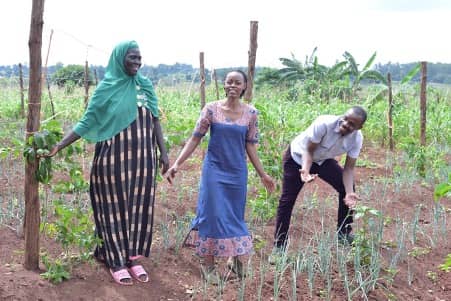
Income from vegetables and formation of VSLA groups
Despite coming from diverse backgrounds and having different cultures, Gloria says they have united in groups to fight a common enemy; climate change and food insecurity. “We have so far sold vegetables worth UGX 1,200,000” (USD $320). They also harvest some of the vegetables for home consumption, supplementing food aid support from humanitarian development partners. GRI has also introduced the village savings and loans association approach to all the five farmer groups. The aim of this approach is to strengthen the capacity of groups in terms of finance management and leadership skills. A total of hundred beneficiaries (sixty females & forty males) have been trained in topics like; record keeping, group dynamics, leadership, constitution and bye-laws, and group marketing. The trainings have enabled the beneficiaries to operate their farmer groups effectively thus achieving sustainability in production and market linkages. To ensure a safety net, the members save money from the harvests and lend it those in most need; paying it back at a later stage with interest. The members get their shares at the end of the year.
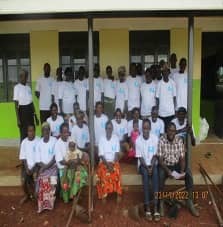
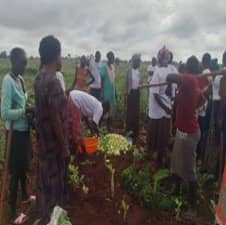
Great initiative and impact but challenges still exist
During a monitoring visit of the farmers, it was noted that while a shallow well was constructed, it was not reliable during the dry season. The farmers also reported that despite having a water source and knowledge about irrigation, the manual watering was tedious; limiting them to the backyard gardens. “I can only water the vegetables in the backyard garden; because it is too tedious to carry water from the source and irrigate the whole field, that is why the vegetables are flourishing but the cone here is stunted” Gloria remarked while standing at the edge of the vegetable garden and the main cone field.
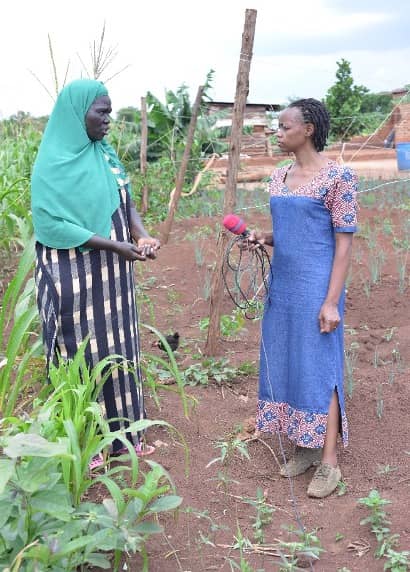
A rallying cry at the COP27 Resilience Hub
The Resilience Hub is an inclusive virtual and physical space to mobilise action on resilience. At the COP27 Resilience Hub, a Catalytic Grant session was organized for former winners to share experiences, challenges and tips on application for the COP27 round. When asked about why he was excited going forward, Stephen instead expressed his worries. “I am not excited, I am worried, the water source we constructed for refugees is not reliable during the dry season, there is need for massive investment in major and cross cutting challenges of water stress and delivery mechanisms”
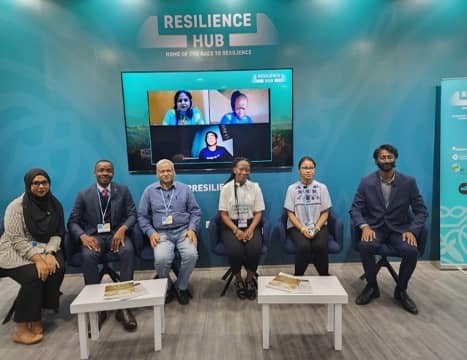
Just like everyone else, the refugees learned the hard way that the global value chains can be disrupted at any point, and it is imperative to have local mechanisms of adapting and being self-sufficient. They are doing their best to adapt locally; but need more support given the context and their socio economic status.
Way forward and Interviewer’s perspective
We are currently working with Global Refugee Initiatives and other stakeholders to advocate for and bring reliable national piped water to the settlement. Once availed, the water will enhance food production by refugees, reducing their dependence on insufficient food aid. Just like everyone else, the refugees learned the hard way, that global value chains can be disrupted at any point, and it is imperative to have local mechanisms of adapting and being self-sufficient. They are doing their best to adapt locally; but need more support given the context and their socio economic status.
About the Author
Stephen is a young hands-on adaptation and resilience practitioner who won a catalytic grant during the CBA-15 round. He is the Founder and CEO of Bees and Trees Uganda, a youth-led social enterprise working to save nature and the climate by giving communities an extra source of income in bee keeping and tree growing. He holds a bachelor’s degree in Environmental Science and is currently pursuing a master’s in Environment and Natural Resource Management at Makerere University, Kampala.

